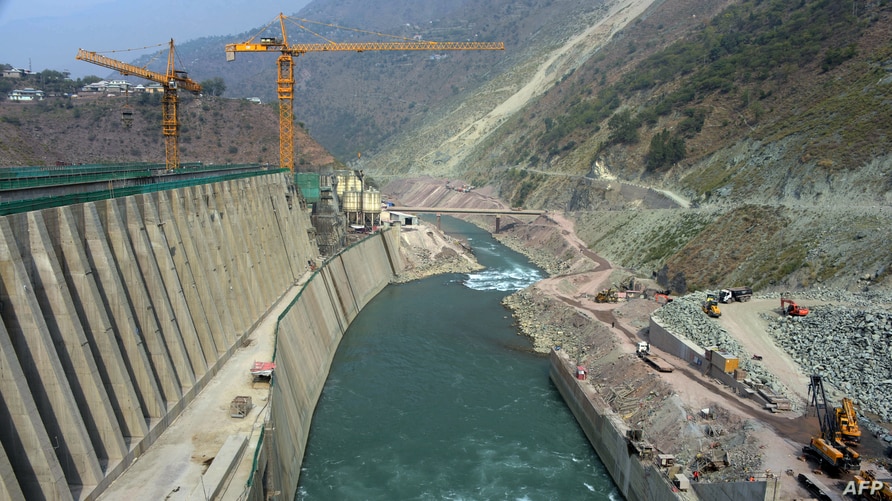Pakistani Kashmir Residents Fear Power Project Will Destroy Economy, Livelihood

Dhaka, 27 August, 2020: MUZAFFARABAD, PAKISTAN-CONTROLLED KASHMIR — Shoukat Nawaz remembers the days when he could enjoy the fresh cold air on his balcony in a three-story house along a riverbank in Muzaffarabad, the capital of Pakistan-administered Kashmir. Today, a stench greets him as he goes outside.
"Now it stinks here. The smell is really bad, and the temperature has also changed because the water level has dropped so much," said Nawaz, a 46-year-old bookseller.
Nawaz was one of hundreds of locals — including members of political parties and trade unions, students, and activists — who joined a torch-bearing rally Monday evening in Muzaffarabad against the diversion of two rivers flowing through the city.
The Save the Rivers Campaign that organized Monday’s protest blames the changes in river flow on a hydropower project, the Neelum-Jhelum Hydroelectric Project, that diverted one of the two rivers that flow through the city to a tunnel to generate electricity.
A second initiative in the pipeline, the Kohala Hydroelectric Power Project, plans to similarly divert the other river. The 1,100-megawatt project is being built by a Chinese company, the China Three Gorges, at a cost of $2.4 billion. It is expected to come online in 2026.
It is facing intense opposition from campaigners who say they have seen the negative impact of the first project and fear the collective effect of the two would completely destroy the river’s ecology, the surrounding city’s environment, and the tourism industry that supports the livelihood of many locals.
The head of Pakistani Kashmir’s environmental protection agency, Adnan Khurshaid, said environmental impact studies had been done and standards and safeguards identified before allowing the project to go forward.
The two rivers, Neelum and Jhelum, flow through the mountainous city together. Their water, glacial melt, used to be ice cold in summer, maintaining the city’s temperature and making it a thriving tourist destination. They also served as a natural waste management system for the city’s untreated sewerage.
The Pakistan government body, Water and Power Development Authority (WAPDA), responsible for the Neelum-Jhelum project, promised to build several sewage treatment plants and three artificial lakes to maintain temperature, and to retain a certain water level in the river at all times.
Residents said while the project came online in 2018, none of the three promises has yet to be fulfilled, leading to not just environmental damage but a negative impact on the health of the local community.
FILE – This photograph taken Oct. 31, 2017, shows Chinese engineers working on the Neelum-Jhelum Hydropower Project in Nosari, in Pakistan-administered Kashmir's Neelum Valley.
Cases of hepatitis, malaria and typhoid have increased after the diversion of the first river, according to Dr. Ejaz Ahmed, a community health and child specialist in Muzaffarabad.
Ahmed said he has observed less rain and higher temperatures in the city since the change in water flow.
"We are facing severe issues due to the diversion of one river. We cannot afford the diversion of the other," he said.
The prime minister of Pakistani Kashmir, who earlier in the year agreed with the campaigners and promised that he would help address their concerns, seems to have changed his position and is now in favor of the project.
His government pointed out that the project will create thousands of jobs and millions of dollars as water usage charges.
“Initially, Kohala will fetch in 10,000 jobs for locals and electricity and taxes for the government," said Dr. Mustafa Bashir, a minister in Pakistani Kashmir’s government.
He said the Kohala project included five artificial lakes as well as schools and parks to provide education and jobs for locals.
"This project's life is 100 years and it will be handed over to us free of cost after 30 years," allowing the Kashmiri government to earn millions in taxes on electricity produced in future, he said.
WAPDA only paid the Kashmiri government water usage charges for the earlier Neelum-Jhelum project.
Some residents who hoped to sell their land for a good price for this project also support it.
“The project will lift the economy of the area due to provision of jobs to locals,” said Naheed Abbasi, a contractor whose land and fuel pump are expected be acquired for the Kohala project.
The Kashmiri EPA promises to enforce the implementation of mitigation measures. Save the Rivers campaigners say the past record of the agency does not bode well for the future.


